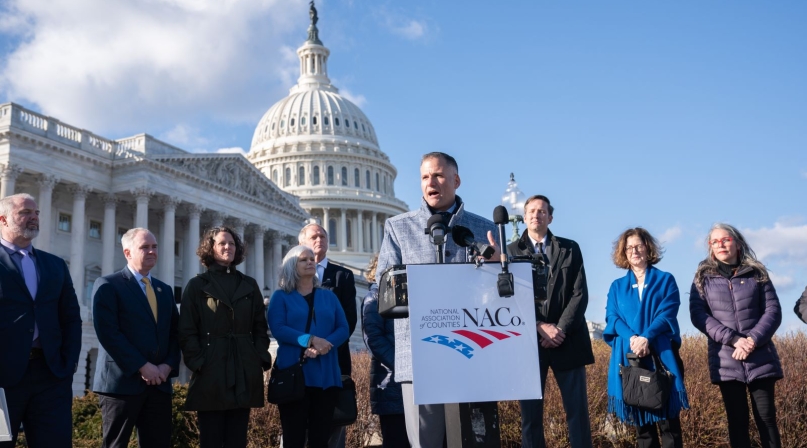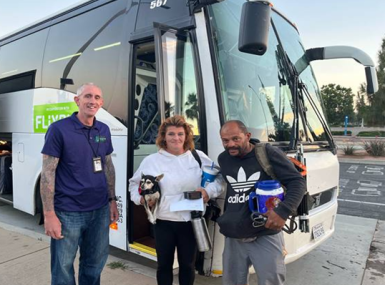County officials, members of Congress team up to support extension of Affordable Connectivity Program

Key Takeaways
Several members of Congress teamed up with county officials Tuesday, Feb. 13 at a Capitol Hill press conference to show their support for extending the Affordable Connectivity Program, which provides internet access to more than 23 million households across the country.
Learn more
New enrollments for ACP ended last week and the program is set to run out of funding by the end of April.
“Already, I have people calling me saying, ‘I'm not going to be able to keep my internet, I'm not going to be able to afford it,’” Rep. Debbie Dingell (D-Mich.) said. “Millions of families have come to depend on this — it’s their connection to so many things.”
Congress must come together to pass the “bipartisan, common-sense and urgent” extension, or else millions of Americans will be left behind in the digital divide, Rep. Norma Torres (D-Calif.) urged.
Rep. Mark Molinaro (R-N.Y.) said the ACP’s bipartisan supporters in Congress are working “every day” to move the $7 billion proposed extension forward.
“We recognize both here in Washington, Republicans and Democrats, along with county leaders across the country, how critically important it is to our economies, to our communities, to our education, to our social fabric, to ensure that men, women and families can afford to have reliable, affordable and accessible high speed internet access,” Molinaro said.
If the ACP is not extended, tens of millions of households will lose internet access, impacting access to healthcare, education and employment.
“The median price for internet access and service is $75 a month, which may not seem like a lot of money to a lot of people, but I can tell you, as a kid who grew up on food stamps, every dollar matters,” Molinaro said. “And if this program is allowed to sunset, families will be forced to make some really important decisions, and I can tell you what’s going to fall off of their budget — access to the internet.
“There will be seniors deciding that telemedicine is no longer their priority or will no longer have access to it, there’ll be moms and dads who are struggling with mental health who won’t have access to mental health support, because of the lack of internet service. There’ll be kids who need the internet in order to improve their education, to grow and to thrive, who will not have access.”
Cook County, Ill. Commissioner Monica Gordon called the program vital to digital equity, with more than 350,000 households in the county receiving ACP support.
"By providing subsidies for internet services, the program enables residents to stay connected in an increasingly digital world, facilitating access to online education, telehealth services, job opportunities, and government resources," she said. "This is particularly significant for vulnerable populations who may face barriers to affording reliable internet access."
The ACP also acts as a “crucial backbone of support” for rural communities, as well as low-income communities, communities of color and tribal nations, who face the highest barriers to broadband access, said Inyo County, Calif. Commissioner Jeff Griffiths.
“Potential loss of this program cannot only impede our progress, but exacerbate in further marginalizing communities experiencing the digital divide,” Griffiths said. “Finding a solution to prevent the lapse of this program is paramount.”
Counties are “absolutely unified” in support of extending the ACP, said Sonoma County, Calif. Supervisor James Gore, NACo first vice president, who called the program a “moral imperative.”
“This enrollment of residents has allowed county leaders to communicate during natural disasters more reliably, and it’s also helped us reach underserved residents more effectively with critical services, health care and human services,” Gore said. “Internet connectivity is absolutely foundational to the future of our society.”
Resource
Outreach Toolkit for Counties: The FCC’s Affordable Connectivity Program

Webinar
Connecting Residents through the Affordable Connectivity Program
High-speed internet connectivity serves as a crucial component for households to participate in everyday life. Hear from senior leadership at the Federal Communications Commission (FCC) on how the Affordable Connectivity Program (ACP) is helping to connect millions of households and learn how you can expand the program's reach in your county.

Related News

U.S House Subcommittee Considers Reauthorization of the State and Local Cybersecurity Grant Program
The SLCGP provides critical funding to state and local governments to enhance cybersecurity readiness and protection but is set to expire on September 30, 2025.

Team approach, website help California county tackle homelessness
Riverside County, Calif. created a multidisciplinary team to better and more efficiently serve its unsheltered population and share success stories and data through a website.

Podcast: The CIO Reserves
Greenbrier County, W.Va. Commissioner Tammy Tincher, Cook County, Ill. CIO Tom Lynch and NACo CIO Rita Reynolds discuss the pilot CIO Reserves program, which offers IT experts to help rural counties assess their technology and cybersecurity needs.
